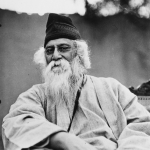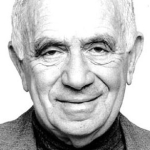On the seashore of endless worlds children meet.
The infinite sky is motionless overhead and the restless water is boisterous. On the seashore of endless worlds the children meet with shouts and dances.
They build their houses with sand, and they play with empty shells. With withered leaves they weave their boats and smilingly float them on the vast deep. Children have their play on the seashore of worlds.
They know not how to swim, they know not how to cast nets. Pearl-fishers dive for pearls, merchants sail in their ships, while children gather pebbles and scatter them again. They seek not for hidden treasures, they know not how to cast nets.
The sea surges up with laughter, and pale gleams the smile of the sea-beach. Death-dealing waves sing meaningless ballads to the children, even like a mother while rocking her baby's cradle. The sea plays with children, and pale gleams the smile of the sea-beach.
On the seashore of endless worlds children meet. Tempest roams in the pathless sky, ships are wrecked in the trackless water, death is abroad and children play. On the seashore of endless worlds is the great meeting of children.






Comment form: